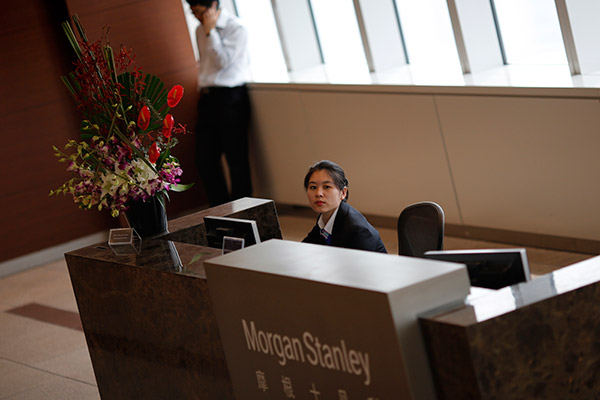Global players praise decision to cut red tape
 |
|
A receptionist at the Morgan Stanley office in Shanghai. [Photo/Agencies] |
Major international banks and insurance companies have welcomed the government's decision to relax regulations in the financial sector.
Leading lenders praised plans to increase foreign ownership limits and allow overseas firms to take majority stakes in mainland securities ventures, fund managers and insurers.
The new rules will give global financial companies unparalleled access to the industry in China.
"HSBC welcomes the changes announced regarding foreign ownership in the financial services sector," said Peter Wong, deputy chairman and CEO at HSBC Holdings Plc.
"Relaxing ownership regulations will be another step in the opening and reform of China's economy. Further foreign participation will help China's financial markets become more global, supporting greater internationalization of the RMB (renminbi)," he added.
The Oversea-Chinese Banking Corporation Ltd, or OCBC, in Singapore was just as bullish about the decision.
A spokesman stressed this showed that the Chinese government was serious about opening up the financial sector. He also pointed out it would have a positive impact on the regional banking community.
"OCBC Bank, with its business history and sound network in China and the region, looks forward to the development of the policy and will carry out feasibility studies upon release of details," the spokesman said.
After hearing the news, leading Wall Street banks announced plans to increase their presence.
Morgan Stanley, a major financial services firm and investment bank with its headquarters in the United States, aims to acquire a controlling stake in its joint venture in China.
"A global corporation of the size and stature of Morgan Stanley should control its destiny," James Gorman, chairman and CEO of Morgan Stanley, told the media following the policy shift.
Nearly all the leading global investment banks have joint ventures with local lenders and financial firms in China.
But many have complained their lackluster business performances have been due to a lack of control.
Last year, JPMorgan Chase & Co sold its 33.3 percent stake in JPMorgan First Capital, a joint venture with the Shenzhen-listed securities broker First Capital Securities.
Still, the New York-based multinational banking and finance house applauded the decision to further "liberalize" the sector.
"JPMorgan welcomes any decision made by the Chinese government that looks to liberalize its financial sector further," the bank stated.
Yet it replied cautiously when asked whether it would re-enter the market, stating it currently had "no plans to create new joint ventures that could be announced".
Goldman Sachs Group Inc, though, plans to increase its presence in the mainland.
The leading Wall Street investment bank owns 33 percent of Beijing-based Goldman Sachs Gao Hua Securities Co.
Reports have since surfaced that it is negotiating with its Chinese business partner so "it will have equity control", Bloomberg News said, citing people familiar with the discussions.
The global financial house did not respond directly to China Daily's inquiry regarding its plan to acquire a controlling stake but stated, "it is safe to quote from previous reports."
Officially, the firm is delighted with the move to cut more financial red tape.
"We welcome the announcement and look forward to playing a greater role in the China capital markets," Goldman Sachs said in a statement.
The overseas limit in life insurance joint ventures will also be raised to 51 per cent in three years and removed entirely after five, according to Zhu Guangyao, China's deputy finance minister.
AIA Group Ltd is the only foreign life insurer which had a wholly-owned subsidiary in the mainland before the cap was introduced.
"The statements did not give full details and a timeframe," a spokesperson for AIA said without commenting further apart from welcoming the move.
AIA is the largest independent publicly listed pan-Asian life insurance group with operations in 18 regional markets.
















